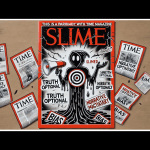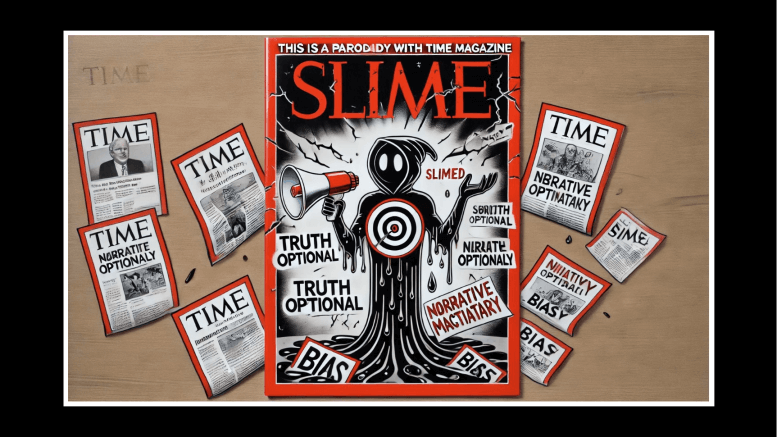Playback speed:
Opinion
So, when I heard that TIME has made DJT the 2024 Person of the Year, I read it, and I invite you to read it too and find the commentary below. Perhaps they should change their name, as you will discover that TIME Magazine “slimed Trump.”
Donald Trump2024 TIME Person of the Year
By Eric Cortellessa
Updated: December 12, 2024 9:41 AM EST | Originally published: December 12, 2024 7:20 AM EST
Descriptive Bias
- “Mar-a-Lago was quiet three days before Thanksgiving” – Sets a dramatic stage unnecessarily.
- “Totems to Trump were displayed everywhere” – Implies an air of self-obsession.
- “The empty rooms felt less like a millionaire members’ club than a museum” – Framing his estate as an exaggerated shrine.
Loaded Terms
- “Trump’s political rebirth is unparalleled in American history” – While this may be factually correct, the tone is dramatic.
- “His first term ended in disgrace” – A value-laden characterization rather than factual reporting.
- “Attempts to overturn the 2020 election results culminating in the attack on the U.S. Capitol” – Frames events entirely negatively without balance from Trump’s perspective.
- “Strongman vision” – Suggests authoritarianism rather than simply a firm policy stance.
Framing Past Controversies
- “He was shunned by most party officials” – Selective interpretation of GOP reactions.
- “The first former President to be convicted of a crime—a fact that did little to dampen his support” – Omits context about ongoing political support despite controversies.
- “An assassin’s bullet missed his skull by less than an inch” – Sensationalizes a fact with unnecessary dramatization.
Policy and Campaign Bias
- “Trump saw a nation ready to smash [norms]” – Implies destructive intent rather than an alternative political vision.
- “He ran on a strongman vision, proposing to deport migrants by the millions” – Loaded language that could have been neutrally stated as “proposing mass deportations.”
- “He promises to usher in a foreign policy rooted in ‘America First’ transactionalism” – Suggests mercenary motives without offering potential benefits.
- “He believes he has tools to fight back: punitive tariffs, bare-knuckle negotiations” – Describes tactics with unnecessary negativity.
Criticism Without Counterpoint
- “Whether Trump can actually fix the root causes of Americans’ anger is another question” – A leading statement that presumes failure.
- “He risks tearing down the constitutional norms and institutions” – Predicts harm without evidence or acknowledging counterarguments.
- “Trump has proved twice now that he can surf to power on anti-incumbent sentiment, a cult of personality, and divisive rhetoric” – Dismisses his electoral appeal as manipulation.
Characterizing Supporters
- “His grievances resonated with suburban moms and retirees, Latino and Black men, young voters and tech edgelords” – Frames policy appeal as grievance-based.
- “Donald Trump is a complicated person with simple ideas” – Patronizing tone when quoting Kellyanne Conway.
Details Overemphasizing Negatives
- “A pro-Trump mob swarms the Inauguration Day stage” – Omits legal proceedings and outcomes of January 6 participants.
- “Children again being ripped from their parents” – Sensationalizes a complex immigration policy debate.
- “The operation would come at a steep cost… estimated upwards of $300 billion” – Predicts fiscal failure without alternative views.
Foreign Policy Framing
- “Willing to upend the nation’s postwar role as a bulwark against authoritarianism” – Frames foreign policy changes as reckless.
- “Ending forever wars and boosting U.S. economic advantage requires working with others” – Suggests unilateralism will fail without evidence.
Focus on Drama
- “His defiance in the aftermath of the shooting—rising bloodied, fist in the air, chanting ‘Fight!'” – Dramatic emphasis on spectacle.
- “Kind of a nasty title, huh?” he said about an abortion memo” – Highlights a trivial detail unnecessarily.
Selective Expert Commentary
- “The scale of change that we’re going to see is unprecedented, and the implications for government are enormous” – Predicts disaster without balance.
- “It’s a self-inflicted disaster” – Frames immigration policy negatively without counterpoints.
- “Unprecedented disruption” – Characterizes reforms in a solely negative light.
This list shows how the article uses tone, framing, and selective emphasis to shape a reader’s perspective on Trump.

SLIMED – A Parody of TIME Magazine
- IMAGE: This is a parody and is not affiliated with TIME Magazine. Created for satirical and commentary purposes under fair use.
- Design Assistance: OpenAI DALL·E Image Generator
- Copyright: The parody cover is a transformative, satirical work protected under fair use and does not infringe on TIME Magazine’s trademarks or copyrights.
- This blog post was developed with the assistance of ChatGPT, an AI model created by OpenAI, used for research, brainstorming, and writing support. Final edits and content are the author’s own.

